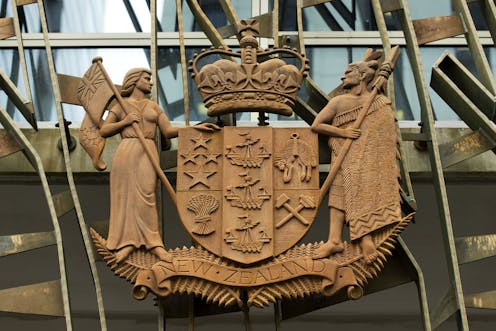
Claims of “judicial activism” are nothing new. Ever since the term was coined by US historian Arthur Schlesinger in 1947, it has been regularly invoked in the United States to describe judges perceived to be going beyond their constitutional role.
In the United Kingdom, the Daily Mail took it a step further in 2018 and labelled three judges “Enemies of the People” in a headline about the legal complexities of Brexit.
In New Zealand, the term seems to have first appeared in the early 1980s and has cropped up fairly regularly ever since to describe judges who have allegedly strayed beyond their responsibilities to interpret and apply the law.
Critics argue such “activist” judges are usurping the sovereignty of parliament as the only lawmaker in our constitutional system. But more recently the rhetoric has been taken up a notch.
Claims of radicalism
This year, Minister of Regional Development Shane Jones described one judge as a “communist” (Jones said the comment was taken out of context), and said some recent judicial decisions were “beginning to show elements of totalitarianism”.
Others have argued for legislative change. Lawyer Gary Judd KC has called on parliament to “assert its constitutional sovereignty to counter a campaign of judicial activism, starting with preventing tikanga Māori from becoming a compulsory subject for law students”.
ACT Party leader David Seymour has justified the Treaty Principles Bill as necessary because “activist judges and bureaucrats” had “twisted the meaning of our founding document to give different groups of people different rights”.
But perhaps the most thorough and extensively researched claim of judicial activism comes from the New Zealand Initiative think tank. In its recently released report, Who Makes the Law? Reining in the Supreme Court, author Roger Partridge argues that:
in recent cases, the Supreme Court has been actively stepping out of its lane, blurring the traditional separation between the roles of judges and Parliament. This shift represents a significant departure from the Court’s proper constitutional function.
Specifically, the report argues, the Supreme Court has begun “stretching or even ignoring statutory language” and taking a “radical new approach” to the common law (that is, the law built over time from judicial decisions, rather than acts of parliament).
The report makes several recommendations for reform, including amending legislation to restrict the way courts can engage in their interpretative role. It also suggests reforming the judicial appointments process so that future candidates must commit to a list of what the report deems “orthodox judicial constitutional principles”.
Without such reform, the report argues, “we will see an ongoing erosion of the foundations of our legal system”.

Parliament remains supreme
But not everyone agrees the Supreme Court has taken a “radical new approach”. As the legal scholar Paul McHugh argued in 2008, jurisprudence (case law) surrounding the principles of the te Tiriti o Waitangi/Treaty of Waitangi has been “cautious and conservative”.
Taking that line, then, it can be argued more recent development of jurisprudence simply builds on that conservative tradition of the common law. Chief Justice Helen Winkelmann has described this process as “picking up the threads”, which simultaneously brings
stability through the doctrine of precedent, while also allowing for the injection of new ideas and for the creation of new responses as required.
Parliament is the supreme lawmaker in our constitutional system. But, by weaving these “threads” of common law, judges also act as lawmakers alongside parliament. Unlike parliament, however, they are constrained by the need to follow precedent (only departing from it when justified).
This is why any development of the common law is necessarily cautious, slow and incremental. Given this structural conservatism, there is some irony that claims of judicial activism come largely from conservative voices.
The suggestion the courts are a hotbed of radical activism also brings to mind the observation of former US Supreme Court Justice Anthony Kennedy:
An activist court is a court that makes a decision you don’t like.
Politicising the courts
If recent Supreme Court decisions contain new approaches and ideas, they are still part of the same common law system that allowed a former chief justice to declare in 1877 that the Treaty of Waitangi was “worthless” and a “simple nullity”.
Or, to take another example, the system that allowed a judge of the Court of Appeal to opine in 1997 that the inability of same-sex couples to marry did not amount to discrimination.
Cries of judicial activism did not follow those decisions. They were not described as political statements. Indeed, in the case of same-sex marriage, parliament eventually disagreed and changed the law in 2013.
Parliament remains supreme. It can simply amend legislation in response to Supreme Court judgements it doesn’t like. That is entirely appropriate, and an instance of what is termed “dialogue” between two branches of government.
There is nothing wrong with disagreeing with decisions of the Supreme Court (I have built a career out of it). But it’s another thing to argue the court should not have the capacity to make those decisions in the first place.
To legislate against that capacity would undermine the constitutional foundation of an independent judiciary by risking its politicisation. That would be far more radical than the Supreme Court and the inherently conservative common law.
Marcelo Rodriguez Ferrere does not work for, consult, own shares in or receive funding from any company or organisation that would benefit from this article, and has disclosed no relevant affiliations beyond their academic appointment.
This article was originally published on The Conversation. Read the original article.







